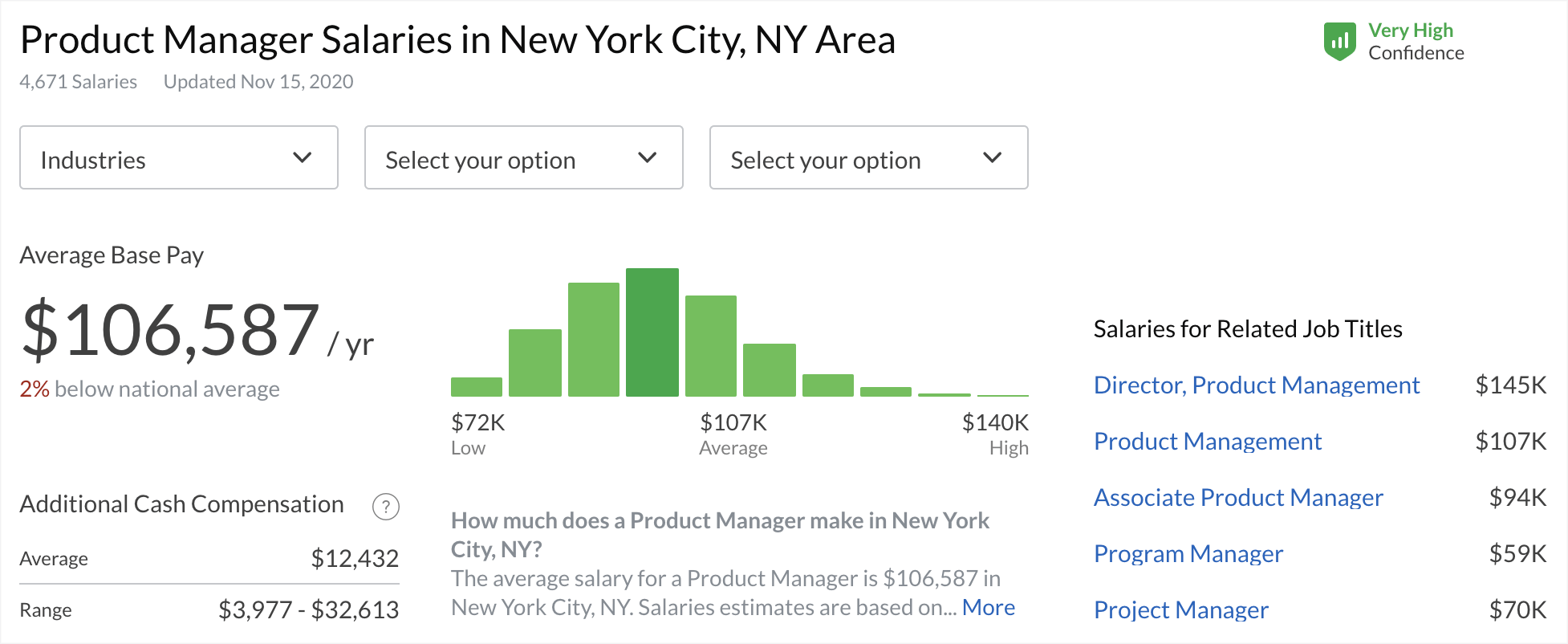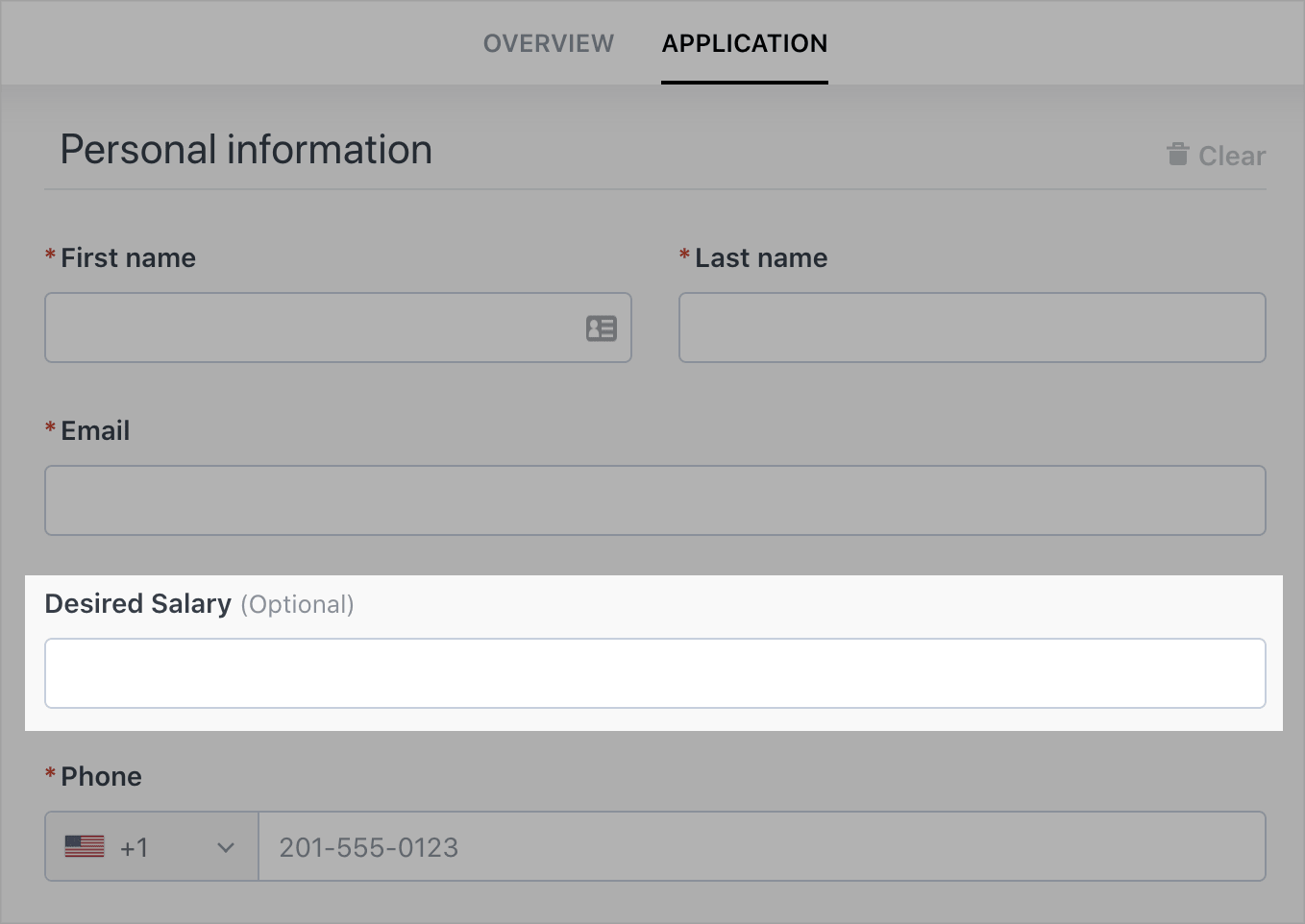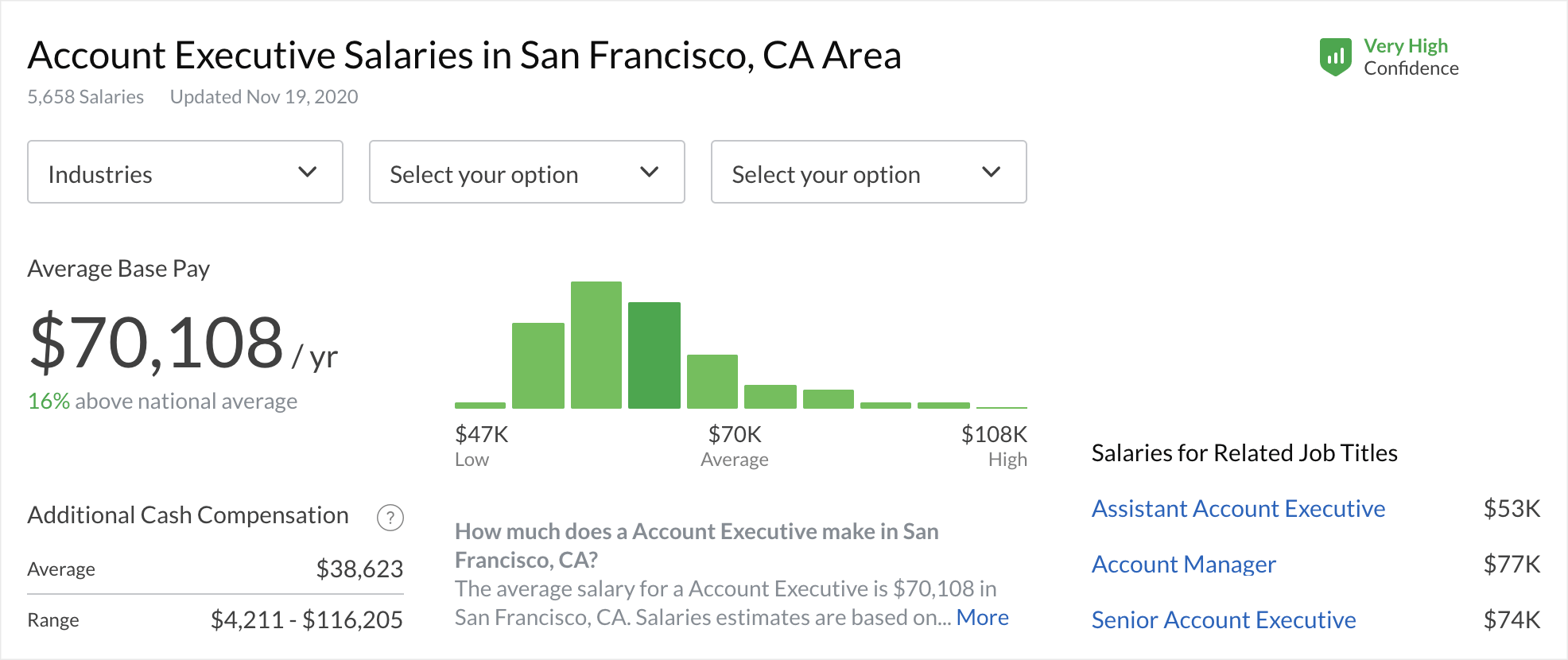Talking about salary is not a fun thing to do.
But it's the one conversation that has the single largest impact on your future earnings. If you're not prepared, you could miss out on hundreds of thousands of dollars down the road.
But there's good news! This guide is going to teach you specific, actionable frameworks that you can use to confidently handle any salary questions you run into in job applications or interviews.
We'll specifically cover:
- Why it's so important to answer questions about desired salary the right way
- How to effectively research salaries so you understand all of the ranges and outcomes you can work with
- How to answer questions about your desired salary on a job application (with examples!)
- How to answer questions about your desired salary in an interview (with templates!)
By the end of this article, you're going to be a pro at salary negotiation and you're going to walk away with a compensation package that reflects what you're worth.
Why It's So Important To Answer Desired Salary Questions The Right Way
A question about your desired salary may seem like a small ask on the surface. A single field in your online app or a single question in that interview. But the answer you give has serious implications!
Whenever a company opens a role, they set a budget for the salary they're willing to pay that hire. For example, let's say that Company A has decided to hire a new Software Engineer. They assess their needs and decide that they are willing to pay up to $120,000 for this new hire.
Continuing the example, you are a Software Engineer who currently makes $80,000 per year and you are applying for this role.
Here's how the desired salary question plays out in two common scenarios:
Scenario #1: You think that you're highly underpaid at $80,000 per year. You're worth at least double that and this company should pay you what you're worth! So you enter $160,000 into the desired salary field. The following week you hear that the company has decided to move forward with other candidates and you have no idea why. After all, you were qualified for the role!
Well, your desired salary was $40,000 over the company's budget. That was a bridge too far for them and they might have had other candidates who were equally as qualified but asked for a salary that was in their range. In this case, you disqualified yourself.
Scenario #2: You want more money, but you don't want to seem greedy and/or be disqualified due to money. An extra $15,000 seems like a reasonable ask, right? You put in a desired salary of $95,000.
A few weeks later, you're entering the second round of the interview process excited about your prospects! What you don't realize is that if you get the job, you potentially left $25,000 on the table.
See how things get tricky?
The good news is, there's hope! There's a way to answer this question that won't disqualify you while enabling you to maximize your potential earnings…and it all starts with research.
Research Is The First Step In Any Desired Salary Conversation
If you want to maximize your salary, you need to do your research.
Understanding what companies typically pay for roles like this is going to give you a ton of insight into the range that they're likely comfortable with. When you pair that up with your current salary and your expectations, you can land on a number that puts you in a great position to negotiate.
When you're researching, you want to look at several factors:
- The average salary for your target job title in the location where you'll be working
- The salary range (top and bottom) for your target job title in the location where you'll be working
- The salary that your target company pays for your target role
- The salary that your target company's competitors pay for people in similar job titles
That can seem like a lot of info to gather, but if you use the right resources, it can be fairly straightforward and easy to get. Here are the ones I recommend:
Glassdoor.com – Glassdoor makes it super easy to research salaries by job title, company, and location. All you need to do is plug in the title of the job you're looking for and the location where you'll be working. For example, here's what salaries look like for Product Managers in New York:

Glassdoor even offers a salary calculator where they ask you a few questions and then help you calculate a salary that's right for you based on their data!
PayScale – PayScale is another site that has a lot of fantastic information on salaries from different companies, job titles, industries, and more. They also have a calculator to help you determine what compensation range is reasonable for you.
H1BData.info – H1BData is one of my favorite tools out there. When companies sponsor an employee for a visa, they report the salary that they are paying this employee. This means that you're able to see the exact salary that someone in your job title at a specific company was able to earn. The good news is that H1BData scraps all that data and makes it easily searchable. For example, here are 3 reported salaries from Account Executives at Microsoft:

The goal of your research is to identify a number that's above the average salary for the role you want without straying too far from reasonable expectations.
If the average salary is $150,000 but the upper limit is $360,000, you probably want to aim for something like $200,000 – $225,000 instead of $325,000 right off the bat.
This is the number you're going to keep in your back pocket when you start to answer this question.
How To Answer Questions About Your Desired Salary On A Job Application
If you're using online portals, the first place you'll be asked about your desired salary is in the online job application.
Again, it seems fairly innocuous. It's just another field on the application, just like your name, email, phone number, etc:

But as you've learned, your answer here can make a HUGE difference in your final compensation package. When it comes to filling out this field, you have three answer options:
Desired Salary Answer #1: Leave It Blank
One of the most obvious options is to simply leave this field blank. Especially if it's listed as optional like you see in the screenshot above. If you don't answer it's not a big deal, right? And you save yourself from having to share your salary, right?
That's true…But I believe there is a better answer here that shows our interest, engages the employer on the topic, and still leaves room for negotiation. With that in mind, I wouldn't leave this field blank.
Desired Salary Answer #2: Commit To A Fit, Not A Number
Whether the desired salary question is required or not, it's still smart to give an answer. Running the risk of looking like you dodged the question can do more harm than good. But we still don't want to put all of our cards on the table just yet…
In his fantastic book on negotiation Never Split The Difference, Chris Voss recommends shifting your conversations away from monetary terms when possible. In his words, this “makes your offer seem reasonable by offering things that aren’t important to you but could be important to them.” It also allows you to negotiate on multiple fronts instead of just focusing on one thing.
As a way to start down that path, you can leave an answer that conveys your interest in the role as well as your desire to prioritize fit over salary. Here's the copy/paste:
Desired Salary: I'm incredibly excited about this opportunity and I'm negotiable on salary, but my top priority is making sure this is a good fit on both sides.
This makes it clear that you're interested, that you're open to land on a salary that makes sense, but above all, a great fit is the most important thing to you! That's a fantastic way to start the conversation.
Desired Salary Answer #3: Pick A Reasonable Number
There are a number of reasons why you might need to share a number. Maybe the “desired salary” field only accepts numbers. Or maybe a recruiter emailed you and said they'd love to bring you in for an interview but they need to know your desired salary first.
When this is the case, your best bet is to share a reasonable, above average number based on your research. My rule of thumb is a figure that's in the 75% – 85% range of what's listed on the job description.
Let's look at another salary example here, this time for Account Executives in San Francisco:

In this case, the lowest salary is $47,000 while the highest is $108,000. That's a range of $61,000. Given our rule, 70% would be ~$43,000 and 80% would be around $49,000. Using the 70% number, we add that to our lowest figure ($43,000 + $47,000) to get $90,000.
That's our figure! Notice how it's above average, but still a ways away from the top end of the range. That's a great place to be.
Finally, if you're able to use characters in the desired salary field, try to provide some context. I like to use this line:
Desired Salary: I'm currently being considered for roles in the range of $90,000.
This is a subtle way to create some scarcity and some implied social proof that will make your number seem more compelling to the company.
If you're not able to add the additional language, no worries! Just add in the number that you found using the equation above.
Side Note: The Legality of Asking About Salary
When you're preparing to talk about your desired salary, you should know that in many places it's illegal for companies to ask you about your salary history. It's not illegal for them to ask about expectations, but they can't ask you what you've made in the past. Currently, there are 19 states that have a ban on employers asking about salary history. You can look up the laws in your state in this HR Drive post.
How To Answer Questions About Your Desired Salary In A Job Interview
Congrats! You made it to the interview stage, which means you're one step closer to landing that job offer.
At this point, you've either run into the question of desired salary or you're about to. Most recruiters won't let you get past the early stages without a number because they don't want to waste their team's time if you're not aligned on compensation.
This can feel scary, but it's actually a good thing! You don't want to waste your own time on a company that isn't going to pay you what you're worth, so don't be afraid. Instead, do your research, follow the framework, and you'll be in great shape.
Answering the question of desired salary in an interview follows a fairly similar framework to how we answered it for the online app. The only differences is that the conversation is happening live so you want to be prepared.
When the recruiter brings up the question, you want to follow this 3-step framework:
Step #1: Restate Your Desire To Find A Fit Before Discussing Money
Like we did earlier, the first thing you want to do is shift the conversation away from money. You want to tell the recruiter that you're negotiable on salary but your top priority is finding the right fit. Here's how that might go down:
Desired Salary Conversation
Recruiter: So, can you tell me about your salary expectations?
You: Thanks for asking! I'm negotiable on salary but my main priority is making sure this is a great fit for both sides.
Now, to be fully transparent, you're not going to get away with this answer 99% of the time. No good recruiter will let you leave without an idea of what your desired salary looks like.
But this answer does two things for us. First, it shows that we're not all about money. Instead, we want to make sure this is a place where you can excel and meet the expectations of the company for many, many years.
Second, it puts the ball back in the recruiter's court. They need to come back to you now, which they will be restating their question. That brings us to the next step.
Step #2: Ask Them For Their Salary Range
When the recruiter inevitably tells you, “That's great to hear, we're looking for an awesome fit too. However, we need to understand what you're looking for from a compensation standpoint so we can make sure you're in the range for the role.”
As I mentioned earlier in the article, when companies open a new role, they typically set a budget. We can use that knowledge to our advantage and now is the time to play that card.
You're going to say, “I completely understand! If you're open to it, would you mind sharing the range that you have budgeted for this role? That way we can both understand expectations and land on something that's a great fit on both sides.”
Boom! We just turned the tables in a super polite way. Now we're asking the recruiter to share their range with us.
I know this might be an uncomfortable thing to ask, but most recruiters worth their salt will actually give you a sense of what the company has budgeted because they know it's the fastest route to the next round.
On your side, getting the recruiter to share the first number stacks the odds in your favor because you can adjust your number or range on the fly. Or you can defer by saying, “Thanks so much for sharing, that range is in line with my expectations.”
Then you live to fight another day without giving away your number.
Step #3: Share The Number You've Calculated
This is essentially a repeat of the third step in the last section.
If the person you're speaking to will not walk away without a cold, hard number, you're going to need to share something. This is why you've done your research and ran those calculations!
All you need to do is repeat that same line we discussed before:
Recruiter: I'm not at liberty to share that information and, as I mentioned, I do need a number to move forward. Are you willing to share your salary expectations so we can moved forward?
You: I understand. If that's the case, I'm currently being considered for roles in the $XXX,XXX range.
In this case $XXX,XXX is going to be that number in the 70% – 80% range that you calculated earlier.
This is getting into the weeds, but your choice of in the ______ range gives you a bit of wiggle room to negotiate up if you were to make it to the offer stage. The employer could come back and say, “you said $90,000” and you could reply with, “I had mentioned I was being considered for roles in the range of $90,000, given my understanding of the role and X, Y, Z reasons, I believe that $97,000 is a reasonable figure.”
In the early rounds of the interview, that number you share should be enough. If you're in the final round or you've received an offer, check out our guide on negotiating your salary here.
Key Takeaways For Sharing Your Desired Salary
You made it! I hope the strategies in this article made you feel more confident when it comes to handling the question of your desired salary for that next role.
To recap, the major points you want to remember are:
- Research is king – the more information you have ahead of time, the more successful you'll be
- Shift the conversation away from monetary terms or back onto the employer when possible
- If you have to share a number, understand that a “No” from the other side is actually a good thing – you don't want to work at a company that won't pay you what you're worth
I'm wishing you a ton of success as you continue to apply and interview for new roles!




































Thanks for this article! The H1BData resource is awesome, I had never heard of that before and I’m sure it’s hugely underutilized for the purpose of salary research.
I’ve put a few of these methods into action recently and seen some good results. Especially helpful to have the exact templates in there as it can feel awkward to not give a direct answer to these questions.
Thanks so much Rea! The H1B database is a gold mine because you know they’re real salaries. Thanks for the comment!